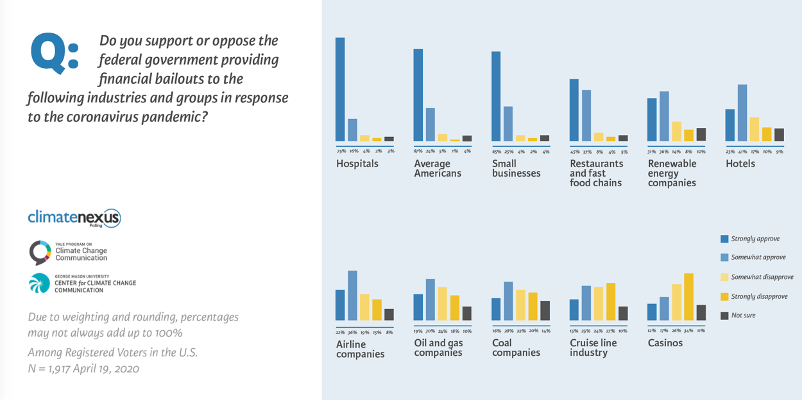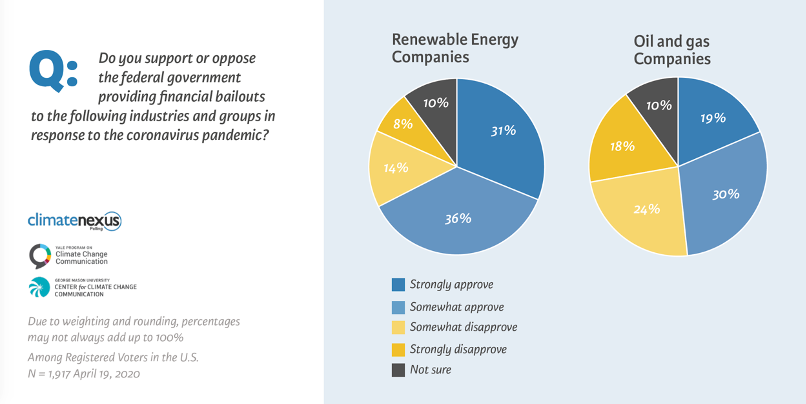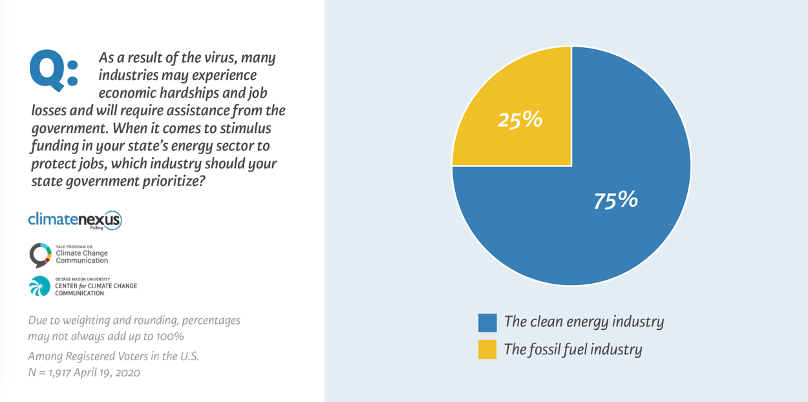Blog · April 27, 2020
New Poll: Voters Prioritize Directing Stimulus Funds to Clean Energy Rather Than to Fossil Fuels
We are pleased to release a new poll today that finds American voters want politicians to listen to scientists and experts regarding how to handle the coronavirus pandemic. The poll, conducted with Climate Nexus and the George Mason University Center for Climate Change Communication also found a majority of voters support financial relief for hospitals, small businesses, and renewable energy companies, while fewer than half support bailouts for oil and gas companies, cruise lines, and casinos.
Responses to COVID-19
Eight in 10 (80%) voters – including about nine in 10 (91%) Democrats and two-thirds (67%) of Republicans – say we should listen to scientists and public health experts who recommend we continue social distancing and keep non-essential businesses closed. Just one in five (20%) say we should loosen the social distancing restrictions and reopen non-essential businesses, even if it means some Americans will be at greater risk of contracting or dying from the coronavirus. Voters are also generally observing social distancing guidelines: More than seven in 10 (71%) say they have not left their home in the last 3 days for non-essential reasons.
Nearly nine in 10 (88%) voters, including Democrats (91%) and Republicans (86%), say politicians should trust the experts and heed their advice, even if they may not personally agree, as opposed to trusting their own instincts and acting accordingly, even if it means going against the advice of experts (12%).
Responses to the Economic Crisis
At least nine in 10 voters support a federal financial bailout to average Americans (91%), hospitals (91%), and small businesses (90%). Two-thirds (67%) support providing financial assistance to renewable energy companies. By contrast, fewer than half support bailing out oil and gas companies (49%) or coal companies (44%). Even fewer voters support bailing out the cruise line industry (40%) or casinos (29%).
About nine in 10 voters support offering guaranteed unemployment benefits to workers impacted by the coronavirus (92%), temporarily freezing evictions and foreclosures (91%), and suspending student debt payments for six months (88%). About eight in 10 support providing 12 weeks of paid family and sick leave for all employees (81%) and increasing federal funding for food stamps (79%). About two-thirds support eliminating up to $10,000 of individual student debt (68%) and cutting payroll taxes (66%).
COVID-19 and the 2020 Election
Voters are split (49% approve vs. 49% disapprove) in their approval of how President Trump is handling the coronavirus pandemic, but more “strongly disapprove” (37%) of his handling of the crisis than “strongly approve” (26%). Meanwhile, voters give their own governors higher marks: More than three-quarters (76%) approve of how their governor is handling the pandemic, while just 21% disapprove.
Ahead of the November general election, more than three-quarters of voters (76%) support expanding vote-by-mail in all states, while only 18% oppose. And about six in 10 (59%) believe the federal government should hold the general election as scheduled with expanded vote-by-mail, while 15% believe the general election should go on as scheduled without expanding vote-by-mail. Eighteen percent say the election should be postponed either for a few months (12%) or indefinitely (6%).
Half (50%) of voters say if the election for Congress in their district were held today, they would vote for the Democrat, while 40% would vote for the Republican, and 10% would vote for neither candidate or for another candidate. And when voters were asked how they would vote if the election for president were held today, Joe Biden (49%) has a nine-point advantage over Donald Trump (40%) nationally.
The poll was conducted on April 19, 2020 with a representative survey 1,917 registered voters in the United States.
For more detail on the poll results, please see the poll toplines.


